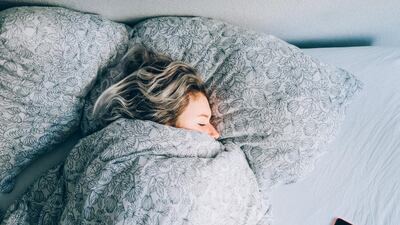Bedtime is phonetime. A global survey this month concluded that 89 per cent of us look at our phone in the first hour of the day, 81 per cent check it in the hour before going to sleep, and nearly half of us peer at it from under the covers during the night. This behaviour, which inevitably results in untimely mental and emotional stimulation, does nothing to help us sleep properly.
A new analysis of the behaviour of American teenagers found a correlation between those who spend more time online and those who don't get enough sleep – which, in turn, could lead to poor performance at school, anxiety and depression. But the effects of lack of sleep have a marked effect on all age groups. Professor Matthew Walker, director of the Centre for Human Sleep Science at the University of California, Berkeley, described in an interview with The Guardian, how sleep deprivation is now widespread in modern society, referring to it as a "catastrophic sleep-loss epidemic". Its consequences, according to various studies, can include obesity, diabetes, heart disease, cancer and premature death.
But whenever technology gets us into a mess, you can be certain that technology will make a spirited attempt to haul us out of it. In the past couple of years, there has been a marked increase in the number of products marketed at insomniacs, in the knowledge that desperate people are prepared to spend significant sums on the promise of some shut-eye.
The global market for sleep aids, of which gadgetry is a part, is predicted to be worth up to US$80 billion (Dh293bn) by 2020, and this trend was evident at the Consumer Electronics Show in Las Vegas earlier this year where a section was devoted exclusively to sleep-related technology.
Sleep trackers, which aim to measure the amount of sleep you're getting each night, use accelerometers, microphones and other sensors to detect tossing and turning, and report back their findings in the morning. Since the appearance of the first sleep tracking smartphone apps towards the end of the last decade, these measurements have become more sophisticated – although they still stop short of polysomnography techniques used in sleep clinics. Sensors such as iFit Sleep and S+, can track heart rate or breathing intensity, while last year Apple bought a Finnish sleep tracking firm, Beddit, with a view to incorporating its technology into its own products. Sleep tracking has, however, been criticised for its passive nature. After all, our bodies can already tell when we haven't had enough sleep; many of these trackers merely provide the numbers to confirm the extent of the insomnia without doing anything practical to address it.
Other trackers, such as Misfit Ray and Aura, detect when you’re in your lightest phase of sleep and gently nudge you awake at the most appropriate time, minimising grogginess and making you feel more refreshed. This idea of “natural waking” is also used by a range of lighting products, including Lumie’s Bodyclock Starter and the Philips Wake-Up Light; by simulating sunrise and sunset in the comfort of your bedroom, they aim to evoke the experiences of our ancestors who never had to contend with the horror of electric lighting.
There’s broad agreement that the “blue” light emitted by electronic devices has a powerful effect on the circadian rhythms that dictate how sleepy we are; this has led to the incorporation last year of “Night Shift” in Apple phones and tablets, and recently a “Night Mode” on some Android devices. Both alter the colour temperature of the screen based on time of day, but they don’t suddenly make screen-gazing compatible with satisfying sleep; they merely dampen its worst effects.
Those who find themselves distracted by unwelcome sounds as they drift off may turn to noise-masking gadgets. American audio firm Bose took a step into this market earlier this month when it announced a crowdfunding campaign for its Noise-Masking Sleepbuds; they pop into your ears and provide a selection of 10 soothing soundtracks (such as "Waterfall") to accompany your descent into slumber. In less than a month, almost half-a-million dollars was pledged by people desperate to secure a pair for themselves.
Sleep is evidently big business. Meditation assistants, breathing guides, temperature regulators, crib rockers... the list goes on. Nancy H Rothstein, a sleep advisor to individuals and corporations in the United States, disputed the efficacy of this deluge of technological assistance earlier this year, describing the result to the New York Times as "pandemonium in the bedroom".
Obsession over achieving restful sleep would seem to be counter-productive, and the secret to achieving it would seem to be the same as it ever was: exercise regularly, don’t eat too late... and (latterly) stay away from electronics before going to bed. But the race to provide us with remedies is ongoing.
This week, a British healthcare company used artificial intelligence to try to create the perfect lullaby; the resulting composition, meandering and vague in nature, would surely struggle to compete with the time-honoured efficacy of Twinkle, Twinkle Little Star. The lesson may well be to leave any technology more advanced than the humble alarm clock outside the bedroom door.
_______________
Read more:
Tech solutions to a troubled night’s sleep
Different ways to tackle sleep deprivation and remain healthy
Ways to address sleep deficits
________________

